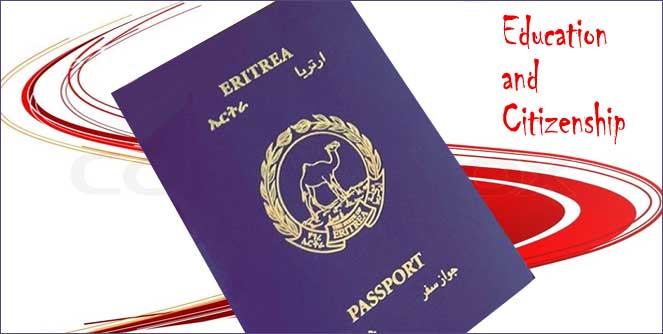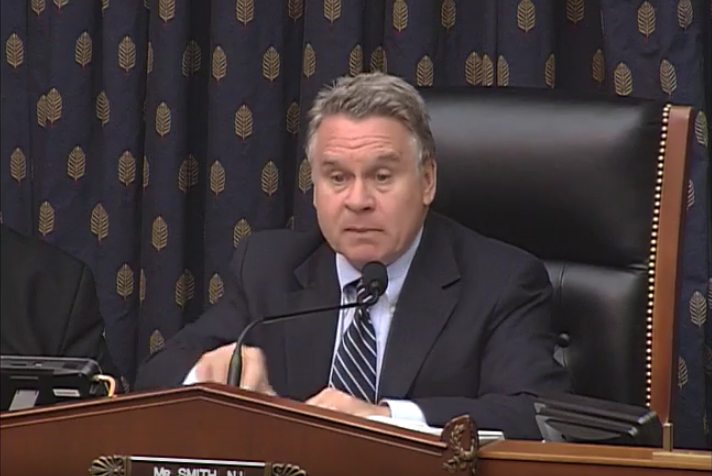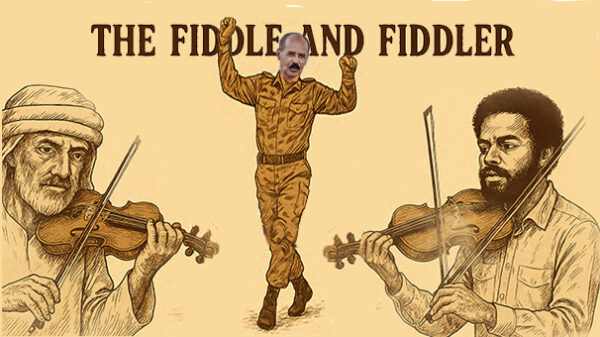Education and Citizenship

“The individual has always had to struggle to keep from being overwhelmed by the tribe. If you try it, you will be lonely often, and sometimes frightened. But no price is too high to pay for the privilege of owning yourself.” Friedrich Nietzsche
A nation without higher education institution that allows its citizens to wallow in the philosophy of living and in the science of politics, in the grammar of logic, in the math of physics cannot be worth living in its midst. Today, Eritrea is such a nation. Sure, it built various small colleges of the technical sorts, but not a single institution that can produce PhDs – This alone tells a story of monumental blunder, a blunder by design toward the dumbing down of a society that would not question authority; a society that would vote with its own feet by fleeing in massive numbers from such an abyss existence instead of fighting to get is country back. In this opinion piece, I will draw a parallel between an educational system of Saudi Arabia and the United States in order to show the choices a free nation makes through debates and discursively arrives at a sensible educational policy that would guide for a century versus one that makes a decision based solely on a power-sharing process. From this parallel, Eritrea will be drawn into the mix to show what the choices she made a quarter a century ago has been like and what the likelihood of the future of its people will be if such a trajectory doesn’t change.
A Brief History of US Education System
In the US a little over a century ago now, philosophers of education dwelled over what it would take to have a productive American citizen, one who can serve his country and the country would reward him materially in return. In short, American thinkers thought by creating public education for every American child until he/she finished high school proven to be the work of a genius. Prior to that, kids as young as nine and ten-year-old children were involved in child labor until 1916. The public-school system made the nation literate, invested in children who grew up to be not only a productive citizen but also dynamic nation that would end up becoming the most innovative and the most powerful nation on earth. They, of course, didn’t stop there. They made sure notions of citizenship was inculcated in the school system along with raising literate children who will become active citizens. Notions of citizenship one can easily see it when kids are involved in mock voting whenever there are presidential elections.
Brief History of Saudi Arabia Education System
Halfway around the world, Saudi Arabia took a starkly different approach to building a Saudi citizen through its public school system. No time to conduct research in this regard, but a nutshell history of its public-school system goes something like this. A power-sharing deal was struck between the Mohammad bin Saud (Royal family) and Muhammad ibn Abd al-Wahhab (Per Wikipedia, the source of Wahabism version of Islam in Saudi and around the world today). The takeaway point here is in Saudi case the accord was done solely between two individuals in how the country’s future was going to be run. In other words, the political administration would be left for the Royal family and the educational system to ibn Ad al-Wahhab. This agreement held until a few years back, where today the young Prince of Saudi Arabia is coming up with his vision that he dubbed “Vision 2030”.
A simple delineation of the countries in the way they decided to pursue their respective educational policies, all that one has to do is one example that any reader can clearly see. By September 11, 2001, Saudi Arabia citizenry production brought Osama, by 2011, the US had produced citizen Obama whose foot was solidly on the grounds of the White House leading the most powerful nation on the earth.
Eritrea’s Educational System?
Now, enter the nascent nation-state called Eritrea that gained its independence in 1991. What we continue to see is a nation with a vision of its citizens who continue to disband and flee at every opportunity they deem to safely disappear from its grips. A nation that wants to create citizens in the image of its ghedli years. SAWA was one attempt at creating a selfless Eritrean as though he or she was in the revolutionary war like his/her predecessors did for thirty years. A nation cannot live or social engineer a revolutionary country. When the revolution concluded in 1991 was when it needed to decide what that Eritrean citizen was going to be like much as the above countries tried to do. If the vision it had didn’t work, why in the world does it continue to repeat the same darn mistakes expecting different results is the question worth repeating and wallowing in?
A nation that does not see innovation, energy, ingenuity in its young cannot be a nation that would succeed in holding the country together. The school system is where it should restart its effort if it is going to reinvent the wheel while it has the chance. The trajectory that Eritrea is following appears to be a path toward the abyss of colossal proportions. Who would’ve thought that Saudi Arabia would overhaul its educational system, but it is. Of course, it has all the resources it needs to make that work. The US is always overhauling its educational systems because there are endless thinkers, learning theorists, critical literacy experts, so on and so forth. Eritrea still has that chance to create a robust school system that enriches its citizens to become literate in every sense of the term literacy implies. There is that chance to do some soul searching by all of the Eritrean citizens, its progressive elements and its conservative elements where they can debate and arrive at a sensible educational policy. For example, constructionism in social science proffers us to construct meaning, thereby allowing us to make sense of our respective lived experiences.
These snippets of anecdotal narratives are moments that should not only be cherished, but they would’ve been what we should be sharing to the coming generation. Unfortunately, we seem to not miss a beat in getting ourselves from one skirmish to another; from one war-front to the next; and now we seem to be taking it to a newly dangerous height, where we are allowing regional players to use us as their proxies as though the former Soviet Union, the U.S., and Cuba were not enough. We seem to be falling for something unimaginably ominous and existential threat that would make the Ethio-Eri war of 1998 a walk in a park. I hope the gods of the cosmos or call it the universe, providence, whatever you prefer, will look after our people and find a way of keeping us away from these dangerous adventures. Instead, we can focus on how to regain our balance and create solid future for the coming generation through philosophizing and analyzing policies and challenging the production of knowledge.
Michel Foucault’s (1926 -1984)* ideas of knowledge production can come handy as we wallow in our attendant issues while we make an attempt to understand our past. Foucault, for example, “… applied theories to historical study. The way Foucault applied his knowledge toward this new cultural history is because he was well versed in de Saussure (structuralism) and Nietzsche’s (philosophical theories). Foucault believed that “political and economic forces, such as governments and the bourgeoisie, shaped knowledge production for their own political and economic interests, which he termed “political economy of truth.” […] Foucault “believed that by studying the production of knowledge through discourses, or the words, phrases, ideas, and symbols associated with a specific topic, historians could better understand the past. He argued that various cultural groups, such as political, economic, or social groups, create and add to discourses to shape knowledge about a particular subject.
Foucault goes on to assert that “Discourses … create epistemes, mental structures which organize knowledge and prioritize new information as important/unimportant, true/false, or scientific/unscientific. These epistemes then shape the identity of individuals and create the mental world in which individuals live. Individuals, therefore, were products of discourses in their lives, rather than historical agents with their own free will” (p. 213). Foucault went beyond theories by developing his own methodology of studying history, which he referred to as “archeology of knowledge. He argued that, like an archeologist, the historian must painstakingly uncover the inner workings and structure of past societies. Because all texts are relative and reflexive, historians cannot just simply interpret them and claim to have reconstructed the truth about what happened in the past and why. Historians must deconstruct texts, closely analyzing them as if they were archeological fragments of the worldviews from which they were created.
Rather than study historical subjects from the perspective of the dominant power that shaped the discourse, Foucault sought to “decenter” the subject under study, examining the past from unexpected perspectives, from “the other”: the outsider, the oppressed, the marginalized, and the anomalous. These alternative perspectives may reveal a rupture which had been covered up by conventional sources” (p. 214).
*Please note that the notes I took on Foucault that I am sharing here was so long ago that I am unable to ascertain which were my words and which were to be quoted. I saw several inconsistencies in the quoting pattern, which is why I am foot-noting it here. But, I thought the message was worth sharing and no time to verify the accuracy of my citation pattern in this piece. Besides, it is my intention to encourage others to tell their stories.



Awate Forum